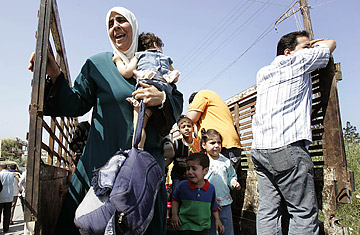
A Palestinian woman and her children exit a truck as they flee the Palestinian refugee camp of Nahr el-Bared, in the northern city of Tripoli, Lebanon, May 24, 2007.
"We used to support the government, now we are all with Fatah al-Islam," said local resident Mohammed Ammar, 22, referring to the small Al-Qaeda-linked faction bottled up in the Nahr al-Bared camp whose leaders have sworn to fight to the death.
When fierce gun battles broke out on the streets of Tripoli a week ago pitting Fatah al-Islam militants against Lebanese security forces, few residents of Lebanon's second largest city had any taste for the shadowy faction which has rarely been out of Lebanon's headlines since emerging late last year.
But a week on, and the mood is changing in districts like Tebbaneh, a poor slum-like quarter in Tripoli long receptive to the clarion call of Islamic extremism. Television footage of seemingly indiscriminate army shelling of the Nahr al-Bared camp, home to 40,000 people, and a crackdown against Islamists in Tripoli have soured sympathy for the government's bid to eradicate Fatah al-Islam.
Two Fatah al-Islam residents of Tebbaneh blew themselves up when surrounded by police in Tripoli last week. The funeral for one was held here Saturday, his shattered body tightly wrapped in a green Islamic shroud, furious mourners yelling revenge packing the street outside his home.
Some residents from here have fought American forces in Iraq. Others battled the Lebanese army in a brief but bloody insurrection in the rain-swept Dinnieh mountains east of Tripoli in January 2000. Among them was Bilal Mahmoud, known as Abu Jandal. When Lebanese troops crushed the Dinnieh rebels, Bilal was captured and jailed. He was released in summer 2005 in a general amnesty for the Dinnieh rebels. His family and friends say he returned to the family home in Tebbaneh and spent a quiet life, attending mosque and reading.
Spray-painted on the stairwell of the run-down apartment block where the Mahmoud family lives are slogans reading "God bless Osama bin Laden", "God bless Abu Musab al-Zarqawi." "He was born naturally religious," said Riad Mahmoud, Bilal's father. "He didn't take part in any fighting. He has been with us since it began last week."
Lebanese newspapers last week quoted the police as saying that members of Lebanon's paramilitary police had attempted to arrest Bilal but shot him dead as he prepared to throw a hand grenade.
But his father, Riad, said that the police "executed" his son in cold blood in front of dozens of eye witnesses. "He had just finished praying at the mosque and was drinking a juice and eating a sandwich," he said. "He was only 24 and they shot him like a dog." Bilal died on the sidewalk of a narrow dirty street of drab apartment blocks on one side and a small garden and beige stone clad mosque on the other. Since his death, the Lebanese army and police apparently have not entered the area, wary of the simmering resentment in this close-knit quarter.
Residents say that dozens of young men have been arrested in the past two months, persecution, they say, against anyone religiously devout. "You cannot buy a razor blade in Tripoli anymore because we are all shaving off our beards to avoid arrest," joked an unsmiling Mohsen, 25.
As TIME talked to residents, a team of police forensic experts led by the head of Tebbaneh police station arrived at the scene of the killing, their presence apparently brokered with local officials to ensure their safety. "We are here to investigate what happened," the chief police officer said. He turned to Riad, Bilal's father, and said quietly "We need you to calm things down. You know how dangerous the situation is. Don't make it any worse with your accusations". The crowd moved back as detectives marked and photographed the numerous bullet holes.
"Abu Jandal was not an outlaw, he was an innocent man and we will exact justice against anyone who takes the law into their own hands, even if they wear police uniforms," said Sheikh Mazen, the imam of the Harba mosque where Bilal prayed.
The Lebanese government has sworn to crush Fatah al-Islam and an imminent showdown at Nahr al-Bared seems to be drawing near, but the boiling resentment in neighborhoods like Tebbaneh suggests that Lebanon's struggle against radical Islamists may be far from over.
